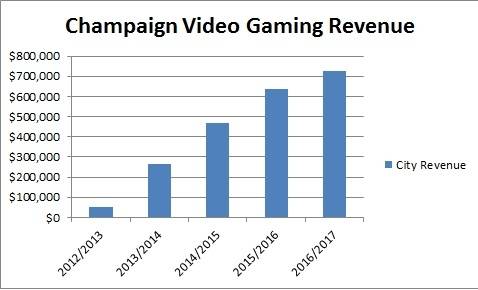Back in July, I wrote about the Champaign City Council’s review of (the lack of) video gaming regulations. In September, the council met again to review the standing moratorium on new gaming and to consider potential ways forward pursuant to city manager Dorothy Ann David’s research. You can read the findings of that research here.
Of some note, Champaign is empowered to regulate gaming however it pleases. Some (like me) might favor a nuclear option that sees video gaming vampirism vanish from Champaign entirely, but that’s not going to happen. The options on the table were
- leave video gaming unregulated;
- impose special restrictions on gaming cafés;
- require a special license for video gaming; or
- set a hard cap on video gaming to allow its growth only to a certain degree.
Based on City Council’s study session, the most likely outcome seems to be establishing new licenses for video gaming.
Many gaming cafés in Champaign currently operate as restaurants to get the liquor licenses they need to host video gaming. As restaurants, 60 percent of their food-and-drink revenue has to come from food, not drink. If there were a “gaming” liquor license, gaming cafés could stop pretending to offer food and avoid cumbersome restaurant regulations. At first glance, this seems like it would make it easier to run a gaming café, and in a sense it would, but it would also allow Champaign to govern gaming cafés with a different set of rules, including through setting a hard cap on gaming licenses, which would create a hard cap on gaming cafés.
Dream a little dream, let’s say that the city council were to set that gaming café cap at 18, Champaign would be at its limit, and no new gaming cafés could open. An interesting issue with this, then, is the subsequent buying and selling of businesses to get the sought-after license. The city manager notes in her findings that “limiting the supply of licenses has unintentionally created what is essentially an ‘after market’ for Class A licenses that are, in effect, bought and sold as assets, often for large amounts of money.” She expects the same would happen with a gaming café license. That’s not something I particularly care about, but the city might because they’d like to collect license fees.
There’s no special cost to running a gaming café right now, but that could change. Several other towns throughout central Illinois charge $500 or more a year for gaming licenses, and some charge an additional annual fee per gaming terminal. The city manager’s report suggests charging $1,000 for the gaming café license and $250 per terminal, which means each gaming café would pay the city of Champaign $2,250 per year for the privilege of operating in Champaign. It’s not a number that would dissuade anyone from opening a gaming café, but I’m partial to Urbana’s number: $1,010 per terminal per year.
Along with a new license just for gaming cafés, the city council could create what the report linked at the beginning of the article calls a “gaming rider.” This would be a supplementary license for bars and restaurants that would allow them to install gaming terminals. Because all video gaming is ugly, not just the café variety, there should be a hard cap here, too, preferably very close to the number of bars and restaurants that already have gaming in place.
Video gaming isn’t going away, nasty blight that it is. The reality is that the city likes the gaming revenue even while recognizing its viral nature and the financial harm it does to the average citizen who plays along.
But why should I care how other people choose to spend their money?
The city is growing increasingly reliant on video gaming tax revenue, with the budget growing year by year to accommodate the ever-increasing gaming income, and we’ve reached a point where we’re balancing the city’s financial health against our willingness to protect our community from the economic and aesthetic cankers video gaming represents.

License fees are something, which is to say they’re not nothing, but they don’t actually curb anyone’s desire to open a gaming café, and more or less, they just go to paying for the time spent administering to gaming cafés new and old. The most realistic means to curbing the growth of video gaming is through the creation of new licenses for video gaming with strong regulations attached to them. You can tell the City Council that you want a low cap on licenses and a full stop on gaming growth among gaming cafés and bars and restaurants by emailing them at council@champaignil.gov.








